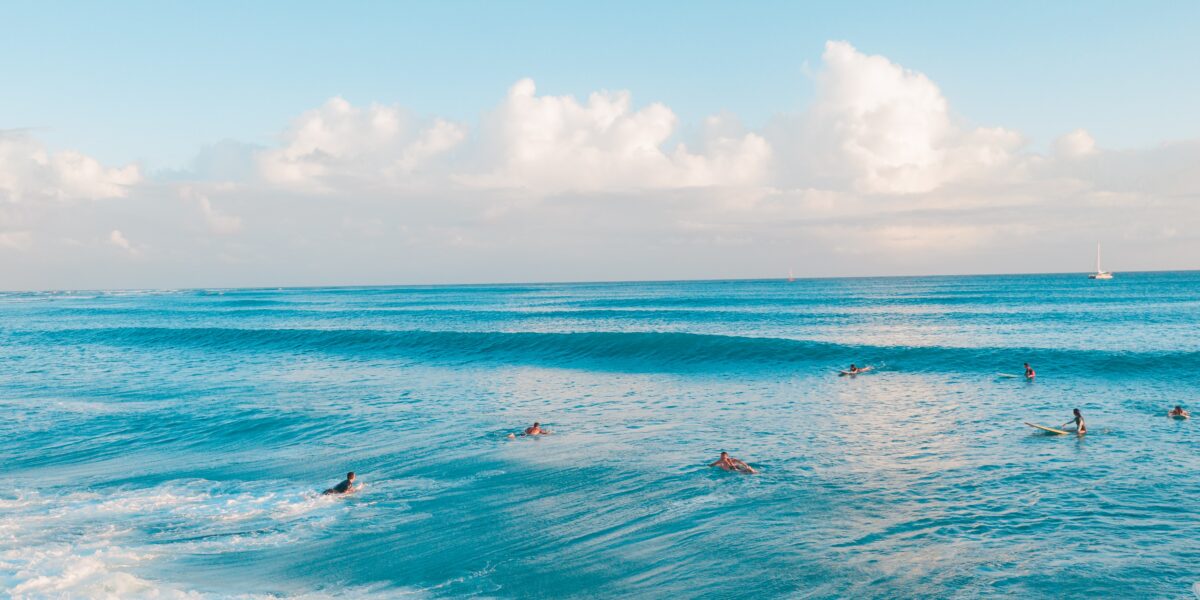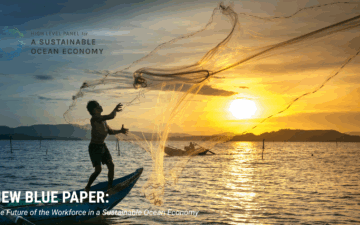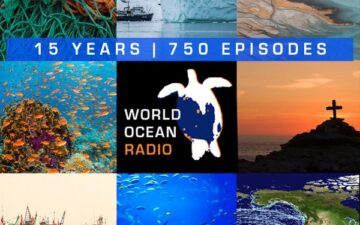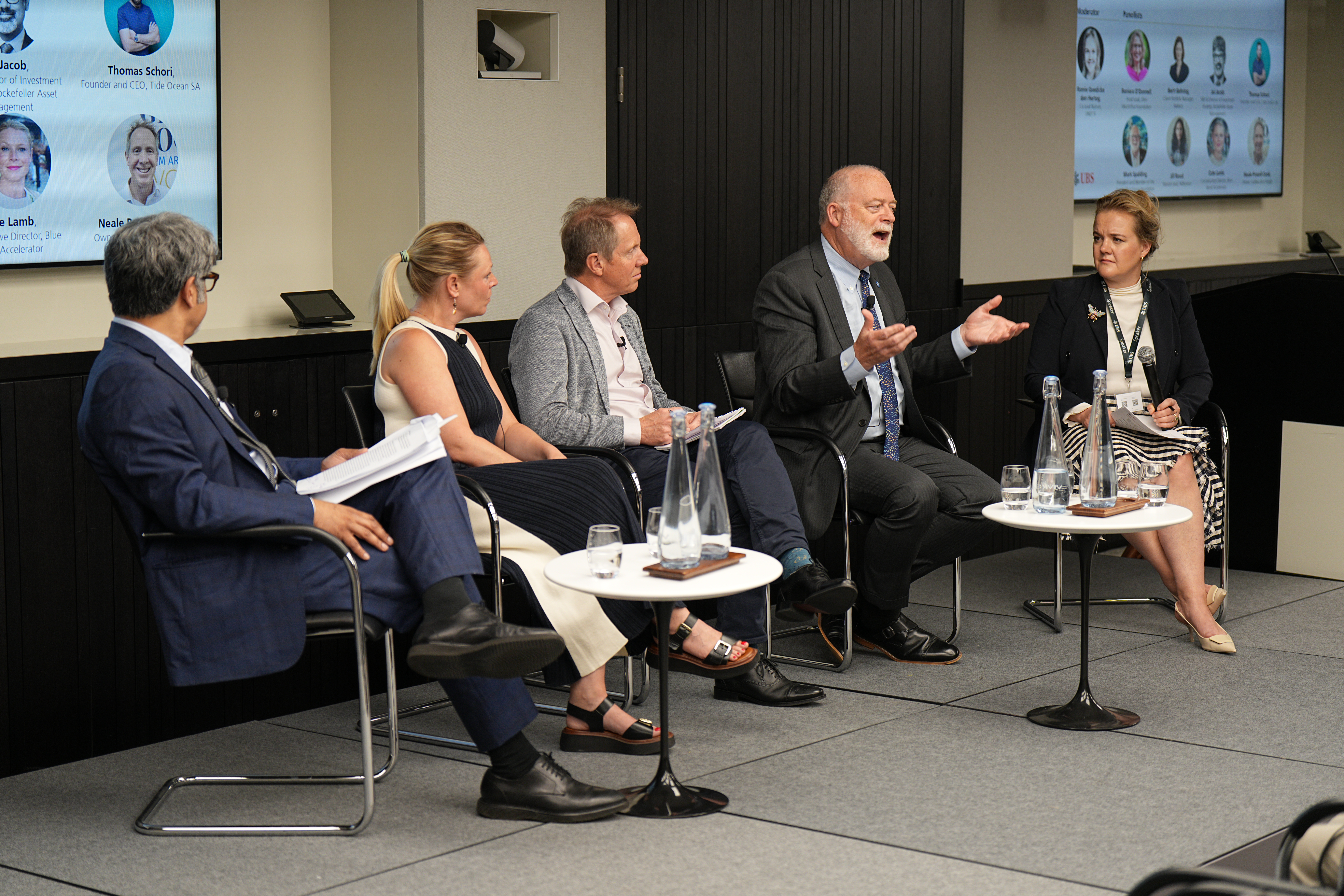Jessica Sarnowski is an established EHS thought leader who specializes in content marketing. Jessica crafts compelling stories intended to reach a broad audience of environmental professionals. She may be reached through LinkedIn.
One Question, Many Answers
What does the ocean mean to you?
If I were to ask this question to 1,000 people around the globe, I would never find two identical answers. There might be some overlap based on local communities, where people vacation, or specific industries (e.g. commercial fisheries). However, because of the ocean’s magnitude across the globe, and people’s individual relationships with it, there is a lot of bandwidth when answering this question.
Answers to my question likely span the spectrum from infatuation to indifference. The “pro” of a question like mine is that there is no judgment here, just curiosity.
So…I’ll go first.
I can sum up what the ocean means to me in one word: connection. My first memory of the ocean, ironically, is not when I saw the ocean for the first time. Instead, my memory takes place in an upper-middle-class colonial-style house in suburban New York. You see, my mother had a variety of seashells arranged horizontally on shelves in the formal dining room. I never asked, but they were likely shells that she acquired over the years while walking along the Atlantic coastline. My mother displayed the shells as a central piece of art (just as any artist would) and they are one main feature of the house that I’ll always remember. I did not realize it then, but the shells first introduced me to the relationship between animals and the ocean; something that is intertwined from the coral reefs to the whales that span the ocean waters.
Many years later, around the time that “flip phones” were invented, I made the drive from Los Angeles to San Diego regularly. I knew that I was getting close to my destination because the freeway would crest above a vast, bright blue Pacific Ocean. There was a rush of anticipation and awe as I approached that arc. The feeling is hard to replicate in other ways.
Thus, my personal relationship with the ocean depends on where I am geologically and in life. However, the one thing in common is that I leave each beach trip with a renewed connection to aquatic features, spirituality, and nature.
How are ocean dynamics affected by climate change?
Planet Earth is made up of many different water bodies, but the ocean at large spans the entire planet. It links one country to another, one community to the next, and every person on earth. This ocean at large is broken down into four traditionally established oceans (Pacific, Atlantic, Indian, Arctic) and a fifth newer ocean (Antarctic/Southern) (NOAA. How many oceans are there? National Ocean Service website, https://oceanservice.noaa.gov/facts/howmanyoceans.html, 01/20/23).
Perhaps you grew up near the Atlantic and summered in Cape Cod. You might remember rough waves smacking the rocky beach, cold water, and the beauty of the rustic beach. Or picture growing up in Miami, where the Atlantic morphed into warm, clear water, with a magnetism that you could not resist. Three thousand miles to the West is the Pacific Ocean, where surfers in wetsuits wake up at six a.m. to “catch” a wave and barnacles line piers extending from the beach. In the Arctic, sea ice melts with the changing temperature of the Earth, which affects ocean levels across the world.
From a purely scientific point of view, the ocean is of great value to the Earth. This is because it essentially slows down the effects of global warming. One reason for this is that the ocean absorbs carbon dioxide (C02) that is emitted into the air by sources such as power plants and mobile vehicles. The depth of the ocean (12,100 feet) is significant and means that, despite what is happening above the water, the deep ocean takes a long time to warm up, which can only help abate the effects of climate change (NOAA. How deep is the ocean? National Ocean Service website, https://oceanservice.noaa.gov/facts/oceandepth.html, 03/01/23).
Because of this, scientists may argue that without the ocean the effects of global warming would be twice as strong. However, the ocean is not immune to damage caused by a changing planet. When C02 dissolves in salty sea water, there are consequences that affect organisms with calcium carbonate shells. Remember chemistry class in high school or college? Give me a chance here to review a concept in general terms.
The ocean has a certain pH (pH has a scale that ranges from 0-14). Seven (7) is the halfway point (USGS. Water Science School, https://www.usgs.gov/media/images/ph-scale-0, 06/19/19). If a pH is less than 7, then it is acidic; if it is greater than 7 then it is basic. This matters because certain ocean organisms have hard shells/skeletons that are calcium carbonate, and they need these skeletons to survive. However, when C02 enters the water, there is a chemical reaction that changes the pH of the ocean, making it more acidic. This is a phenomenon called “ocean acidification.” This degrades the organism’s skeletons and thus threatens their viability (for more information, see: NOAA. What is Ocean Acidification? https://oceanservice.noaa.gov/facts/acidification.html, 01/20/23). Without going into the details of the science (which you may research), it appears that there is a direct cause-effect relationship between climate change and ocean acidification.
This is important (aside from the horror of missing out on your meal of clams in white wine sauce).
Imagine this scenario:
You go to the doctor, and they tell you that you have low amounts of calcium and that, unfortunately, you are heading toward osteoporosis at an alarming rate of speed. The doctor says that you need calcium supplements to avoid a worsening condition. You’d probably take the supplements, right? In this admittedly odd analogy, those clams need their calcium carbonate and if no action is taken to stop the cause of the damage to their skeletons, then your clams are heading toward a dangerous fate. This affects all mollusks (not just clams) and therefore it negatively impacts the fishery marketplace, your fancy dinner menu choices, and of course the importance of mollusks in the ocean food chain.
These are just two examples of the relationship between climate change and the ocean. There are more that this blog is not covering. However, one interesting point to keep in mind is that there is a two-way street between climate change and the ocean. When this balance is disturbed, you and future generations to come will, indeed, notice the difference.
Your Stories
With this in mind, The Ocean Foundation reached out to a variety of individuals across the globe to learn about their personal experiences with the ocean. The goal was to get a cross-section of people who experience the ocean in their own communities in unique ways. We heard from people who work on environmental issues, as well as those who simply appreciate the ocean. We heard from an ecotourism leader, ocean photographer, and even high school students who grew up (presumably) with an ocean that was already affected by climate change. Questions were tailored to each participant, and as expected, the answers are diverse and fascinating.
Nina Koivula | Innovation Manager for an EHS Regulatory Content Provider
Q: What is your first memory of the Ocean?
“I was around 7 years old and we were traveling in Egypt. I was excited about going to the beach and was looking for seashells and colourful stones (treasures for a child), but they were all covered or at least partially covered in a tar-like substance which I now assume resulted from an oil spill(s). I remember the harsh contrast between the white shells and the black tar. There was a nasty bitumen-type smell as well which is difficult to forget.”
Q: Have you had a recent Ocean experience that you’d like to share?
“Recently, I’ve had the opportunity to spend the end-of-year holidays near the Atlantic Ocean. Walking on the beach during high tide – when you are navigating your way between a steep cliff and the roaring sea – truly makes you appreciate the immeasurable force of the ocean.”
Q: What does Ocean conservation mean to you?
“If we don’t take better care of our marine ecosystems, life on Earth is likely to become impossible. Everyone can play a part – you don’t need to be a scientist to contribute. If you are on a beach, take a moment to collect a bit of garbage and leave the coastline a little nicer than you found it.”
Stephanie Menick | Owner of Occasions Gift Store
Q: What is your first memory of the ocean? Which ocean?
“Ocean City… I’m not sure what age I was but going with my family sometime in Elementary School.”
Q: What did you look forward to most about bringing your kids to the ocean?
“The joy and excitement of the waves, shells on the beach and fun times.”
Q: What is your understanding or reflection on the challenges that the ocean faces from an environmental standpoint?
“I know we need to stop littering to keep the oceans clean and safe for the animals.”
Q: What is your hope for the next generation and how it interacts with the ocean?
“I’d love to see actual change in people’s behavior to protect the oceans. If they learn things at a young age it will stick with them and they will have better habits than ones before them.”
Dr. Susanne Etti | Global Environmental Impact Manager for Intrepid Travel
Q: What is your first personal memory of the ocean?
“I grew up in Germany, so my childhood was very much spent in the Alps but my first memory of the ocean is the North Sea, which is one of the numerous seas in the Atlantic Ocean. I also loved visiting Wadden Sea National Parks (https://whc.unesco.org/en/list/1314), a stunning shallow coastal sea with lots of sand banks and mud flats that gives breeding grounds to many bird species.”
Q: Which ocean (Pacific/Atlantic/Indian/Arctic etc.) do you feel most connected to now and why?
“I am most connected to the Pacific Ocean due to my visit to Galapagos while working as a biologist in Ecuador[‘s] rainforest. As a living museum and a showcase of evolution, the archipelago left a lasting impression on me as a biologist and the urgent need to protect the ocean and land-based animals. Now living in Australia, I am fortunate to be on an island continent [where] nearly every state is surrounded by Ocean waters – very different from my home country Germany! Right now, I enjoy walking, cycling, and connecting with nature on the southern ocean.”
Q: What type of tourist seeks out an ecotourism adventure involving the ocean?
“The driving force behind ecotourism is to bring wildlife and nature conservationists, local communities, and those that implement, participate in, and market ecotourism together to ensure that the tourism industry is focused on long-term sustainability rather than short-term profits. Intrepid travelers are socially, environmentally, and culturally conscious. They know they’re part of a global community. They understand the impact we have as travelers and are eager to contribute to the planet and our oceans in a positive way. They are mindful, respectful, and willing to advocate for change. They want to know that their travel does not disrespect the people or places they visit. And that, when done correctly, travel can help both thrive.”
Q: How do ecotourism and ocean health intersect? Why is ocean health so important to your business?
“Tourism can cause harm, but it can also stimulate sustainable development. When properly planned and managed, sustainable tourism can contribute to improved livelihoods, inclusion, cultural heritage and natural resource protection, and promote international understanding. We know the negatives on ocean health, including how various tourist hotspots struggle to manage the ever-expanding influx of travelers, the effects of toxic sunscreen on the underwater world, the plastic pollution in our seas, etc.
Healthy oceans provide jobs and food, sustain economic growth, regulate the climate, and support the well-being of coastal communities. Billions of people worldwide —especially the world’s poorest— rely on healthy oceans as a source of jobs and food, underscoring the urgent need to find a balance to encourage tourism for economic growth and stimulating sustainable incentives for the conservation of our oceans. The ocean might seem endless, but we need to find mutual solutions. This is crucial not only for our oceans and marine life, and our business, but for human survival.”
Q: When you are planning an ecotourism trip involving the ocean, what are the main selling points and how does your knowledge of environmental science help you advocate for both the ocean itself and your business?
“One example is that Intrepid launched the 2022/23 season on the Ocean Endeavour and recruited 65 specialist expedition guides who all share a goal to deliver a more purposeful guest experience in Antarctica. We Introduced a number of purpose and sustainability initiatives, including becoming the first Antarctic operator to eliminate seafood from our regular service; serving one plant-based evening onboard each expedition; offering five citizen science programs that support research and learning; and operating the Giants of Antarctica voyages with WWF-Australia in 2023. We also partnered on a two-year research project with the University of Tasmania, exploring how expedition cruises foster a positive and culturally informed relationship with Antarctica among diverse groups of travelers.
There are certain environmentalists that would say the best way to protect Antarctica is not to travel there at all. That, simply by visiting, you’re spoiling the very ‘unspoiledness’ that makes Antarctica special. It’s not a view we subscribe to. But there are certain things you can do to limit your impact and protect the polar environment. The counterargument, which many polar scientists make, is that Antarctica has a unique capacity to change and educate people about the environment. Almost a mystical force. Turning average travelers into passionate advocates. You want people to go away as ambassadors, and a lot of them do.”
Ray Collins | Ocean Photographer and Owner of RAYCOLLINSPHOTO
Q. What is your first memory of the ocean (which one?)
“I have 2 distinct memories of my very earliest days being exposed to the ocean.
1. I remember holding onto my mother[’]s shoulders and her swimming underwater, I remember the feeling of weightlessness, and it felt like another world under there.
2. I can recall my dad getting m[e] a cheap foam bodyboard and I remember going into the tiny waves of Botany Bay and the feeling of the energy pushing me forward and up onto the sand. I loved it!”
Q. What inspired you to become an ocean photographer?
“My dad took his own life when I was 7 or 8 and we moved from Sydney down the coast, right on the ocean, for a fresh start. The ocean became such a great teacher to me from then on. It taught me patience, respect and how to go with the flow. I turned to it in times of stress or anxiousness. I celebrated with my friends when we rode giant, hollow swells and cheered each other on. It has given me so much and I have based my whole life’s activities around it.
When I picked up my first camera (from a knee injury rehab, time-filling exercise) it was the only logical subject for me to photograph on the road to recovery.”
Q: How do you think the ocean/ocean species will change in years to come and how will that affect your work?
“The unfolding changes not only impact my profession but hold profound implications for all aspects of our lives. The ocean, often referred to as the planet’s lungs, plays a vital role in regulating our climate, and its unprecedented transformation is cause for concern.
Recent records indicate the hottest month ever experienced in history, and this alarming trend is driving ocean acidification and severe bleaching events, endangering the lives and food security of countless people reliant on the ocean’s life-sustaining resources.
Moreover, the surge in extreme weather events, occurring with alarming frequency, adds to the gravity of the situation. As we contemplate our future and the legacy we leave for future generations, the preservation of our planet and its oceans becomes an urgent and heartfelt concern.”
Survey of High School Students from Santa Monica | Courtesy of Dr. Kathy Griffis
Q: What is your first memory of the ocean?
Rising 9th Grader: “My first memory of the ocean is when I moved to L.A. I remember staring at it from the car window, awed by how it seemed to stretch on forever.”
Rising 10th Grader: “My first memory of the ocean is around 3rd grade when I visited Spain to see my cousins and we went to [M]arbella beach to relax…”
Rising 11th Grader: “My parents took me to the beach on jackal island in [G]eorgia and I remember not liking the sand but the water[.]”
Q: What did you learn about oceanography (if anything) in high school (or middle school)? Perhaps recall some specific things that stood out to you if you have learned about oceanography.
Rising 9th Grader: “I remember learning about all the trash and everything that humans have been putting in the ocean. Something that really stood out to me were [phenomena] such as the Great Pacific Garbage Patch, as well as how so many creatures can be affected by the micro plastics or other toxins within them, so much so that entire food chains are disrupted. Eventually, this pollution can lead back to us as well, in the form of ingesting animals with toxins inside of the[m].”
Rising 10th Grader: “At this moment I[’]m volunteering for a program that teaches many different subjects to kids and I happen to be in the oceanography group. So [in the] past 3 weeks there I have learnt about many sea creatures but if I had to choose, the one that stood out to me the most would be the [s]ea star just because of its interesting way of eating. The way a [s]ea [s]tar eats is that it first latches onto its prey then releases its stomach onto the creature to dissolve its body and suck up the dissolved nutrients.”
Rising 11th Grader: “I used to live in a landlocked state so I know the basics of ocean geography like [what] continental drift is and how the ocean circulates cold and warm water, and what a [continental] shelf is, where oil in the ocean comes from, underwater volcanos, reefs, stuff like that.]”
Q: Were you always aware of the pollution in the ocean and the threat to ocean health?
Rising 9th Grader: “I suppose I’ve always grown up having an understanding that there is pollution in the ocean, but I never really understood the enormity of it until I learned more about it in middle school.”
Rising 10th Grader: “No it was not until around 6th grade that I learned about the pollution in the ocean.”
Rising 11th Grader: “Yes that gets drilled heavily in all the schools I’ve been to like since kindergarten[.]”
Q: What do you think the future holds for the ocean? Do you think global warming (or other changes) will damage it in your lifetime? Elaborate.
Rising 9th Grader: “I completely believe that our generation will experience the effects of global warming. I’ve already seen news that heat records have been broken, and will probably continue to be broken in the future. Of course, the oceans absorb most of this heat, and this means that ocean temperatures will continue to rise. This in turn will obviously affect the marine life within the oceans but will also have a lasting impact on the human population in the form of rising sea levels and more serious storms.”
Rising 10th Grader: “I think the future of the ocean is that its temperature will continue to [rise] because of it absorbing the heat caused by global warming unless humanity comes together to figure out [a] [way] to change that.”
Rising 11th Grader: “I think there’ll be a lot of changes in the ocean mostly from climate change like there will [certainly] be more ocean than land as seas rise and not as many coral reefs and just in general as we trade more and put more ships out there the ocean will just literally be louder than it was even 50 years ago[.]”
The Ocean Experience
As expected, the stories above display a variety of ocean impressions and impacts. There are many takeaways as you read through the replies to the questions.
Three are highlighted below:
- The ocean is linked to many businesses and as such, the protection of ocean resources is vital not only for the sake of nature, but also for financial reasons.
- High school students are growing up with a deeper understanding of threats to the ocean than previous generations had. Imagine if you had this level of understanding in high school.
- Lay people and scientists alike are aware of the current challenges facing the ocean.
*Answers edited for clarity*
Thus, when revisiting the opening question of this blog, one can see a diversity of answers. However, it is the diversity of the human experience with the ocean that actually bonds us, across continents, industries, and stages of life.







